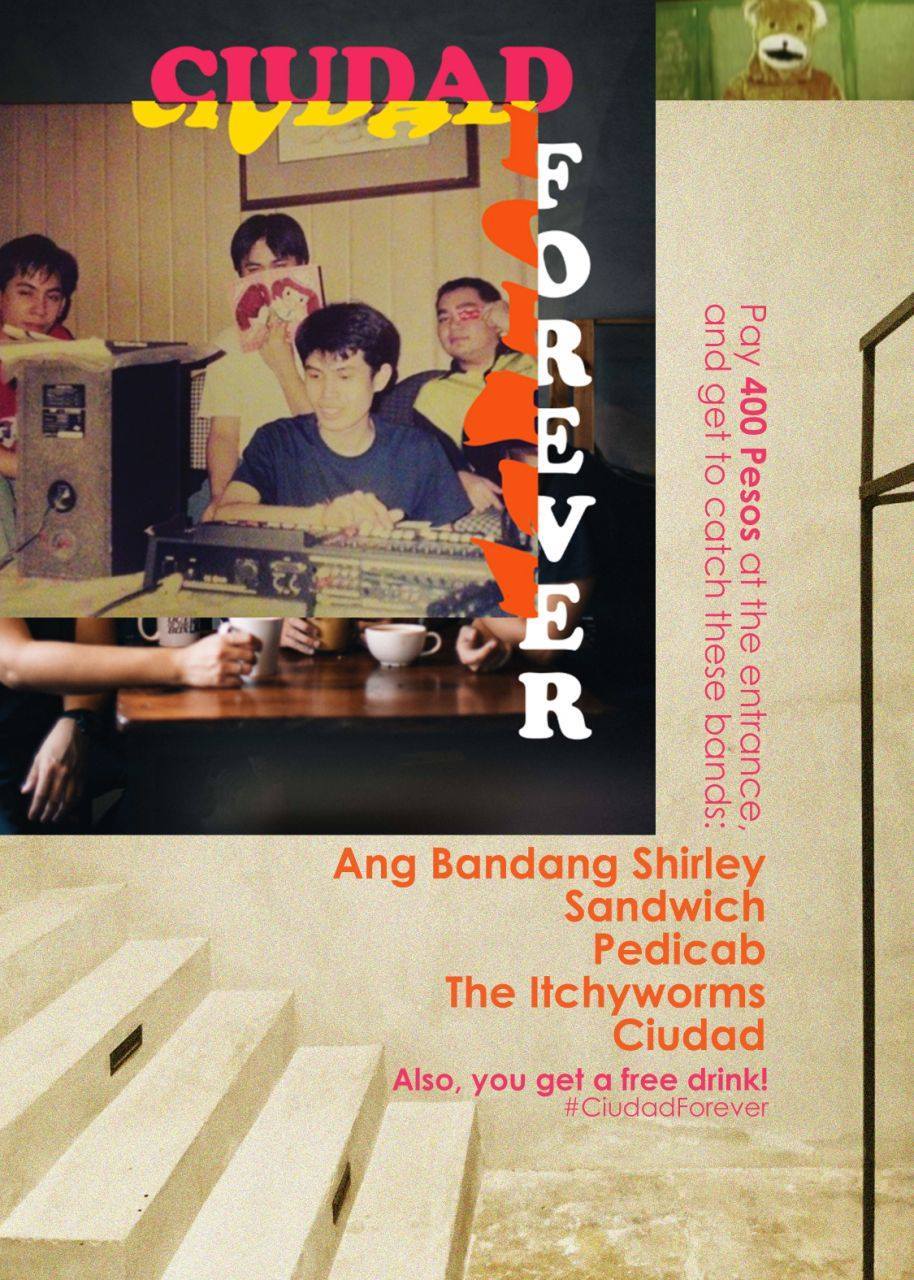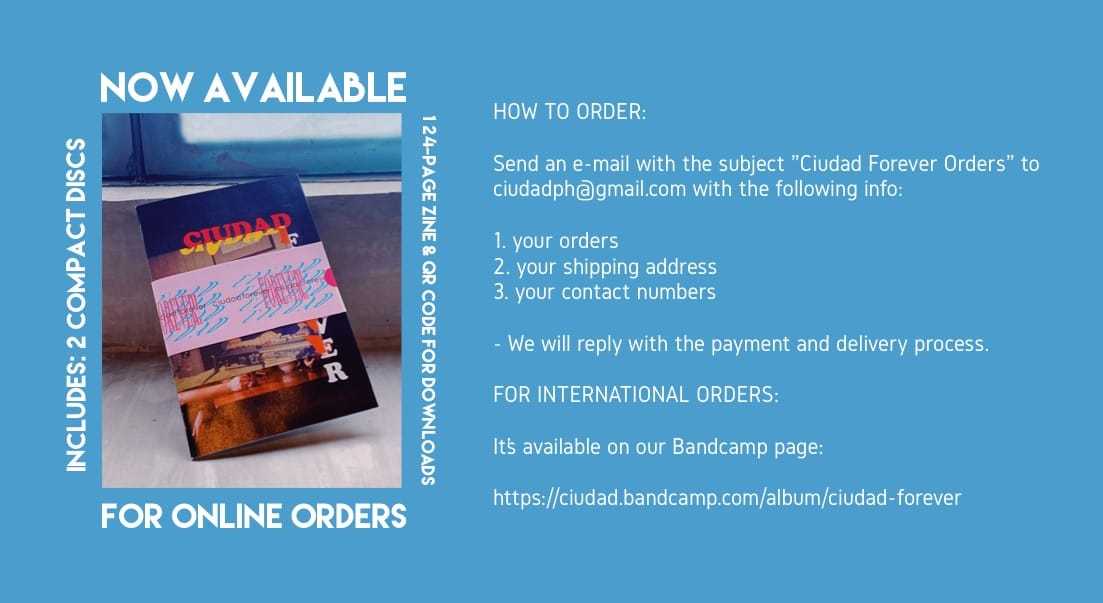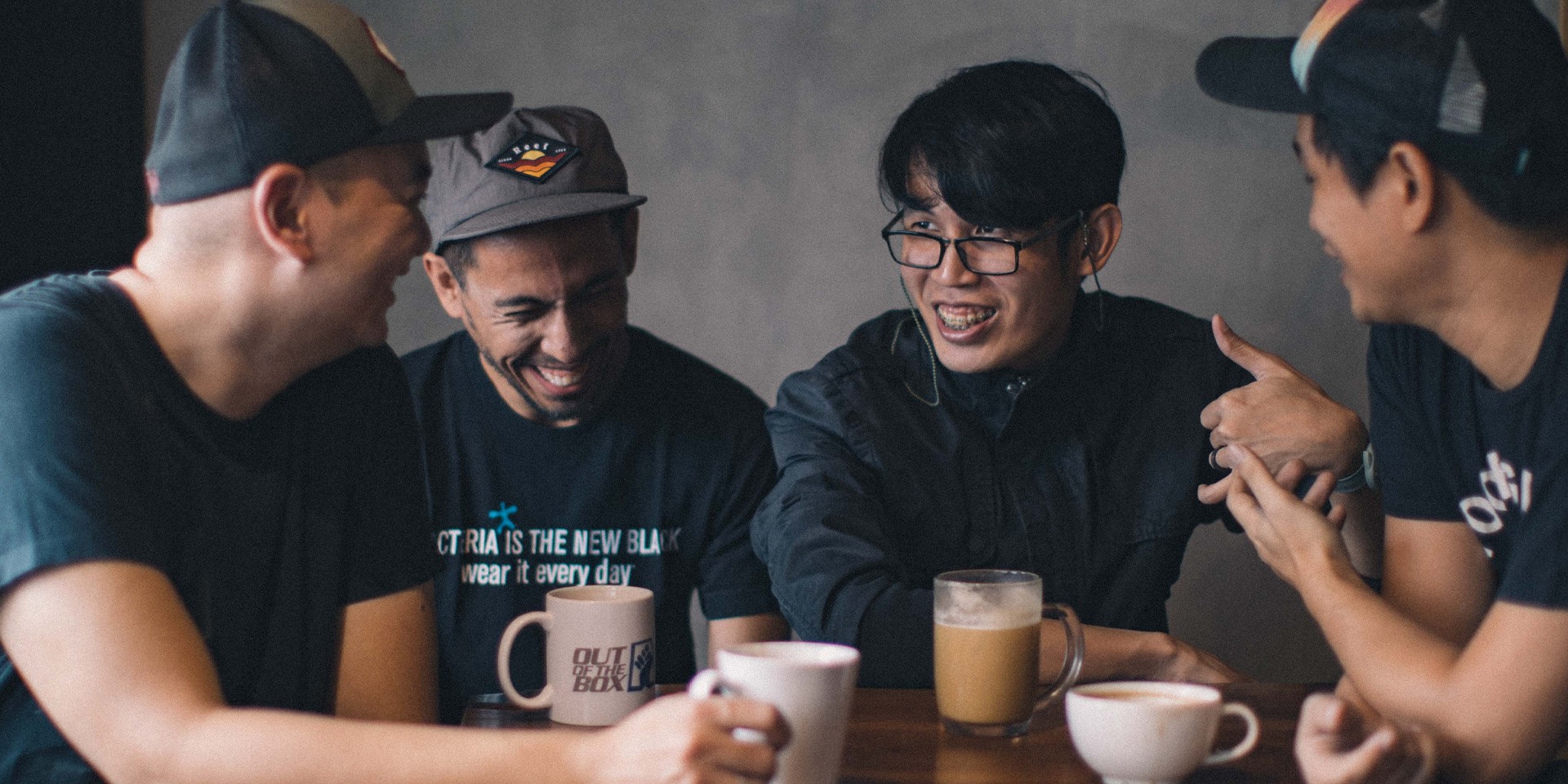There truly is "forever" and Ciudad can prove it.
Two decades of writing tunes and playing shows that act as metaphorical hands in embracing and tickling their listeners have placed Ciudad in a special chamber in the heart of the Filipino music scene. Since they introduced themselves in 2000, they've released six studio albums, gone independent, and took on real-life "adulting" jobs. It's been tough but one heck of a ride, and it's clear that they still have a lot of laughs and band-aids for broken hearts to offer.
Bandwagon caught up with Ciudad to talk about the ups and downs of a band that grew during the pre-streaming era and everything they're looking forward to with the release of their first album in seven years Ciudad Forever.
Hello! How Are You, Mico the Happy Bear? (2000)
Tell us a funny story from the studio when you were working on your debut album.
Mikey: The producers of that album, Raymund Marasigan and Sancho Sanchez, are known for their pranks and antics when producing records. I remember one time when they had me lie down on the studio floor to record vocals for 'Simple Song', so I could nail that relaxed-in-the-bedroom vibe. They even turned off the lights to set the mood. After finishing a whole take of the song, I did a thumbs-up sign to signal them that it’s all good, only to find out that everyone had already left the studio and were all outside in the lobby, watching TV.
What's the story behind Mico the Happy Bear?
Mikey: We had a friend and batchmate from college called Mico who really looked like a happy bear. No kidding! We decided to give him a shout-out by putting him in our first album’s title.
Why did you guys decide to release a 19-track album instead of splitting it into two?
Mikey: When we were starting out, we were heavily influenced by the seminal records of '90s indie-rock bands like Pavement’s Wowee Zowee, and Guided By Voices’ Alien Lanes. We were amazed that these albums were packed to the brim, and tracks would rip through one after the other, silly song after silly song, and often without warning that the next one has already started. Alien Lanes, particularly, has over 30 tracks in it, and that record’s running time is only 41 minutes! We wanted to come up with an album as packed and vibrant like those ones, keeping fillers to a minimum (I personally hate album fillers), with purely just our songs blasting away on people’s stereos. Of course, we were also overexcited and overindulgent then, as we were young and it was our first album.
Is That Ciudad? Yes, Son, It's Me. (2003)
You guys came up with some interesting album titles. How did you come up with this one?
Mikey: We've always wanted to come up with album titles that have our band name in the actual title. Some of our favorite albums, Come on Feel The Lemonheads, With The Beatles, Beatles For Sale, are examples of that. A lot of options surfaced that time, including one that goes like Here Comes Ciudad or something in that vein. But it was Quark Henares, our manager then, who thought of Is That Ciudad? Yes, Son, It’s Me, and that was it. I remember liking it immediately, just because it sounded fun, and it fit the criteria of having our name in the title, but I initially missed the joke that it was supposed to be a pun of “Is That You, Dad?” I got it months later.
What was the transition in going independent for this album like?
Mikey: It was tough, but it was loads of fun. Unlike today, going independent as a band in the early 2000s was a scary thing. Back then, the standard practice was to book a proper recording studio and have a record company pay those bills for you. Recording at home in your bedroom was only suitable for demos, not for final releases. So it was a major leap, and we just had to be all gung-ho about it and enjoy. We eventually found out that recording an album in your own home at your own pace was so much fun. We were like mad scientists left to their own devices in our very own laboratories.
What were the biggest hurdles you faced with this record?
Mikey: The whole recording and creative process was a blast, so the biggest hurdles were everything else that came after that — having the CDs manufactured (no iTunes, Spotify, and digital releases yet at that point!), coordinating with printing presses for the album inlay, doing the paperwork for the publishing rights, etc. I remember that we had to do road trips to the CD manufacturing plants and printing presses on the far outskirts of Manila to turn in our masters, and finally pick up the actual CDs, which were inside dozens of boxes that we had to store in our bedrooms.
We also had to market our album ourselves, relying on word-of-mouth, our mailing list (no social media and no YouTube yet!), and just plain impressing people at our shows, so we could sell the CDs that we just had manufactured.
These are things that we, as musicians, knew nothing about and shouldn’t have been doing ourselves. But because we had to soldier on as an independent band in the early 2000s, we were basically forced to do all these.
It's Like A Magic (2005)
What's the most magical thing about It's Like A Magic?
Mikey: The only magical thing about that album is we were able to turn those embarrassing songs from our early teens into something that sounded good, well-produced, and somehow presentable and listenable.
How did you decide to go back to older material for this album?
Mikey: Recording Is That Ciudad became such a fun process for us that after its release, we wanted to do more and experiment more. We already had newer and more mature-sounding songs by then, but we wanted to develop them further before putting them on record (they would eventually become the songs for the next album, Bring Your Friends). So we turned our attention to our earlier material. We had a treasure chest of songs and ideas coming from the pre-Mico The Happy Bear days that have been discarded or forgotten, and we felt that they were the perfect ’test subjects’ to practice our newly-found home recording knowledge on.
Looking back now, in what ways has your songwriting evolved since your early days as a band?
Mikey: Our songs have evolved from being "tongue-in-cheek, snarky, silly and nonsensical" in the early days, to being "poignant yet hopeful, a bit sensible, and still snarky” nowadays.
Bring Your Friends (2008)
What was the overall theme that surrounded Bring Your Friends?
Mikey: The material for that album was written at a phase in our lives when we were all going through the pains of growing up. Most of the songs were all about hard times, heartbreak, frustrations of "adulting." Those were tough and painful times but we were able to overcome the challenges that came with it through each other’s help, and also through that of our families and friends. So that record was like a dedication and “thank you” to all our friends who were there for us. The album inlay even featured photos of them hanging out with us.
If you could pick one of your heroes to bring as your friends to your upcoming concert, who would they be and why?
Mikey: Chris Walla, Death Cab for Cutie’s ex-guitarist and ex-producer, is one of my favorite producers of all time. As a producer myself, I would like to have him see our show and hear our songs. A considerable number of them has been influenced by his work.
Mitch: I am a fan of basketball. Basketball is the first "idea" I fell in love with the moment I had consciousness. I've been a fan of the NBA team San Antonio Spurs since 1997. The Spurs coach since then, Gregg Popovich, is who I would like to bring along with me to a music event. I've always wondered what goes through the minds of individuals who've accomplished a lot in the world of business and sports when brought to an environment filled with the arts. Just like I've never expected Steve Jobs to be a big Bob Dylan fan and a good friend of Bono.
Jeff: Evan Dando—he was really the first musician/songwriter I admired. Hopefully, he can appreciate how far we've progressed in our music, from the Lemonheads to our sound right now.
Follow the Leader (2012)
It looks like you guys began releasing less tracks per album with every release. Was this a conscious effort?
Mikey: It was more of a natural progression than a conscious effort. I’d like to think that as we matured and grew older, we sort of mastered the art of ‘restraint.’ We slowly took a different turn from our Guided By Voices inspired route, and instead of churning out songs and songs for a packed album, we focused on carefully crafting each song and eventually coming up with more meaningful material. In the end, quality won over quantity.
Do you have any stories from the studio when working on the album you'd like to share?
Mikey: I remember that the whole production process for Follow The Leader was weird and different from our usual approach in our past records. We were operating as a three-piece at that point (Jeff, our guitarist, had to live abroad for a time), and we were experimenting a lot on keyboard-y stuff. At that time, I was already doing jobs as a composer and musical scorer for commercials, films, TV, so we suddenly had lots of tools and an entirely new library of sounds at our disposal.
I remember that we recorded most of the songs inside a very small but comfy room which was my composer’s room at my work. There was a toy drum kit inside which served as the drums for most of the recordings; we just positioned a single microphone anywhere inside that room and captured not the sound of the drums, but the sound of a small room where a toy drum set was being played.
Almost all the final takes in those recordings were the first completed takes, we didn’t feel the need to redo things. It was all done very quickly.
Ciudad Forever (2019)
Tell us the story of how you guys got together after seven years to work on this record.
Mikey: We never actually left the scene, we just embraced our daily lives more after releasing Follow The Leader. Mitch, our drummer, started three businesses called Out of the Box, Cafe 2.0, and 123 Block, and he made me a partner for those so I could give the company some artistic input, and also keep him sane by having me and music-related stuff (which is his first love) nearby within his reach.
One of our pet projects in that company was a studio space where Ciudad and other friends can make music, rehearse, and record. That brought us even closer, and as soon as we had that space, it took only a little time before all four of us in the band got together regularly to make new music again. Less than 2 years later, we had enough new material for Ciudad Forever.
Who else did you work with to rework, remix, and remaster your older material?
Mikey: We worked on redoing, remixing, and remastering the older material ourselves. This time though, we were armed with years of experience and knowledge on record production. So we corrected a few mistakes we did before. Some purists might not like it. Try looking at it as something like George Lucas’ Special Editions of his original Star Wars Trilogy. So that could be a good thing, or a bad thing, or both (laughs).
For one of the re-done songs, we had Roxy Modesto come over to the Ciudad space and bring her ’saxophone army' for her to play in the recording.
What are you looking forward to with the release of this album?
Mikey: We are looking forward to the old and current fans coming back and rediscovering us, enjoying our new material and seeing how we have matured, and then also seeing our old material in a different light, now that some of them have been remixed or redone or remastered.
We are also equally excited for the new and future fans of Ciudad who would get to know us first through this double album. We hope that they would get excited about us and try to dig up more about Ciudad and eventually find our older albums, and then stumble into even more gems in the process. That process of discovering something new, and then loving it, and then diving further into that world for the first time — that is a great feeling and experience. It’s one of the best feelings, actually. I would envy those people.
Check out Ciudad's entire discography on their Bandcamp page.
Ciudad Forever - a 25th Anniversary and Album Release Party is happening on on September 20 (Friday) at 123 Block in Mandaluyong City The upcoming record is their sixth full-length offering, following 2012's Follow the Leader. Details here.

UPDATE (09/23): Online orders for Ciudad Forever have opened. To place an order, email ciudadph@gmail.com with the subject line "Ciudad Forever Orders" with your order, shipping address, and contact number.
For international orders, Ciudad Forever is also available on Ciudad's official Bandcamp page.

Like what you read? Show our writer some love!
-
